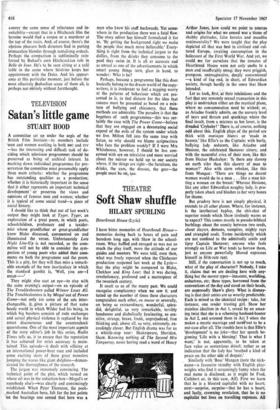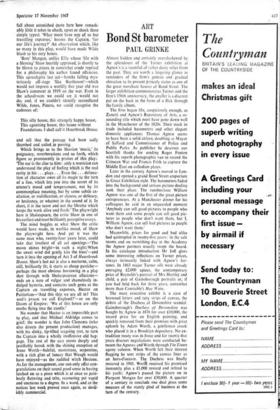Heartbreak Haase (Lyric)
THEATRE
Soft Shaw shuffle
HILARY SPURLING
I have bitter memories of Heartbreak House— memories dating back to hours of pain and boredom long ago, with Shaw in the school- room. What baffled and enraged us was not so much the play itself, more the attitude of our guides and mentors. We were told, even then, what was freely repeated when the Chichester production reopened last week at the Lyric— that the play might be compared to Blake, Chekhov and King Lear; that it was daring, revolutionary, profound and a masterpiece of the twentieth century.
It smelt to us of the musty past. We could recognise complacency when we saw it, and totted up the number of times these characters congratulate each other, en masse or severally, on being so extraordinary, wonderful, splen- did, delightful, so very remarkable, terribly handsome and diabolically fascinating, so sen- sitive, strange, brave, frank, unprejudiced, free thinking and, above all, so very, extremely, ex- ceedingly clever. But English drama was for us a whistle-stop tour: Shakespeare, Sheridan, Shaw. Knowing nothing of The Second Mrs Tan queray, never having read a word of Henry Arthur Jones, how could we point to sources and origins for what we sensed was a tissue of shabby platitudes, false heroics and maudlin sentimentality? We were taught that the play depicted all that was best in civilised and cul- tured Europe, awaiting consumption in the holocaust of the First World War. And yet, we could see for ourselves that the inmates of Heartbreak House were not only snobs to a man and insufferably smug; they were priggish, pompous, unimaginative, deeply conventional —a kind of fag end, in short, of Edwardian society, though hardly in the sense that Shaw intended.
Let us look, first, at their inhibitions and the fact that any remotely sexual transaction in this play is undertaken either on the mystical plane, where no consummation need be wished; or, as Ariadne frankly admits, on the nursery level of tears and threats and spankings where the final insult, from a mistress to her lover, is the dreaded 'Crybaby!' There is, of course, nothing odd about this. English plays of the period are thick with manages blancs or 'made in heaven,' like Ellie's to the Captain; with burly, bullying lady seducers, like Ariadne and Hesione, the celebrated Shotover sisters; and with the mournful cries of their men, like this from Hector Hushabye: 'Is there any slavery on earth viler than this slavery of man to woman?' Also with stern rebukes, like this from Mangan: 'There are things no decent woman would do to a man ... like a man hit- ting a woman on the breast.' Whereat Hesione, like any other Edwardian naughty lady, is pro- perly taken aback and blushes to her very bones for shame.
But prudery here is not simply physical, it extends to all other planes. Where, for instance, is the intellectual byplay, the chit-chat of superior minds which Shaw tirelessly warns us to expect? This comes mostly in pseudo-biblical burblings about the enmity between two seeds, about slayers, demons, vampires, mighty rays and strangled souls. Terms incidentally which are not confined to the admittedly senile and tipsy Captain Shotover; anyone who feels strongly on Life or War tends to borrow them, just as anyone powerfully Moved expresses himself in fifth-rate rant.
Still, if the conversation is not up to much, what of the play of character? Nobody, I take it, claims that we are dealing here with any- thing but the merest types—innocent, worldling, seductress, etc; these types, borrowed from the conventions of the day and stood on their heads, are supposedly Shaw's glory. What is dismay- ing is that their antics are so wearily predictable. Each is mixed to the identical recipe: take, for instance, one tender trusting girl. Show her stainless idealism in Act 1, reveal by an amaz- ing twist that she is a scheming husband-hunter in Act 2, and astound them in Act 3 when she makes a mystic marriage and turriVout to be a nut-case after all. The trouble here is that Ellie's 'development' is no joke—that her speech be- ginning 'Life with a blessing! That is what I want,' is not, apparently, to be taken at face value as sententious drivel; rather as an indication that the lady has 'reached a kind of peace on the other side of despair.'
Similarly with 'Boss' Mangan (note the nick- name—a favourite standby with English play- wrights who find it screamingly funny when the real name is disclosed, as it might be Fred, Cuthbert or, in this case, Alf). First we learn that he is a bloated capitalist with no heart; next—surprise, surprise—that he has a heart; and lastly, crowning revelation, that he is no capitalist but lives on travelling expenses. All
fall about astonished (note here how remark- ably little it takes to abash, upset or shock these simple types). 'What more have any of us but travelling expenses,' booms the Captain, 'for our life's journey?' An observation which, like so many in this play, would have made Wilde blush to his very bones.
'Boss' Mangan, unlike Ellie whose 'life with a blessing' Shaw heartily approved, is shortly to be blown to pieces in somewhat crude reprisal for a philosophy his author found offensive. This apocalyptic last act—bombs falling mys- teriously off-stage 'like Beethoven'—which would not impress a worldly five year old was Shaw's comment in 1919, on the war. Even in the schoolroom we could see it would not do; and, if we couldn't identify secondhand Wilde, Jones, Pinero, we could recognise the cadences of: This silly house, this strangely happy house, This agonising house, this house without Foundations. I shall call it Heartbreak House.
and tell that the passage had been sadly thumbed and soiled,in passing.
Which brings us to the Shavian 'music,' its poignancy, reverberations and so forth, which figure so prominently in praises of this play: 'The ear is the clue to him: only a musician can understand the play of feeling which is the real rarity in his ... plays ... Even the ... delinea- tion of character owes all its magic to the turn of a line, which lets you into the secret of its utterer's mood and temperament, not by its commonplace meaning, but by some subtle ex- altation, or stultification, or slyness, or delicacy, or hesitancy, or whatnot in the sound of it. In short, it is the score and not the libretto which keeps the work alive and fresh.' The playwright here is Shakespeare, the critic Shaw in one of his earliest and most brilliantly perceptive essays.
The mind boggles at what Shaw the critic would have made, in warlike mood, of Shaw the playwright here. And yet it was the same man who, twenty-four years later, could take that loveliest of all act openings—`The moon shines bright—in such a night/When the sweet wind did gently kiss the trees'—and turn it into the openinglof Act 3 of Heartbreak House. Shaw's last act is also a nocturne, calm, still, brilliantly lit; it starts as cheap pastiche— perhaps the most obvious borrowing in a play shot through with Shakespearean allusions— ends on a note of vulgar and shamelessly in- dulged hysteria, and contains such gems as the Captain on travelling expenses, Hector on Patriotism—`And this ship we are all in? This soul's prison we call England?'—or on the Doom of Empire: 'We of this house are only moths flying into the candle.'
No wonder that Hector is an impossible part to play, and that Michael Aldridge comes to grief; the wonder is that John Clements (who also directs the present production) manages, with his dinky, tip-tilted seagoing trot, to turn the Captain into a wholly inoffensive old bag- gage. The rest of the cast seems deeply and justifiably bored, with the shining exception of Irene Worth—baleful, monstrous, serpentine, with a rich glint of lunacy that Waugh would have enjoyed—as the raddled witch Hesione. As for the management, one can only offer con- gratulations on their sound good sense in having latched on to a piece which is at once so pain- lessly flattering and trite, reassuring yet vapid and unctuous to a degree. In a word, and as the notices last week proved once again, so devil- ishly commerciaL



































 Previous page
Previous page